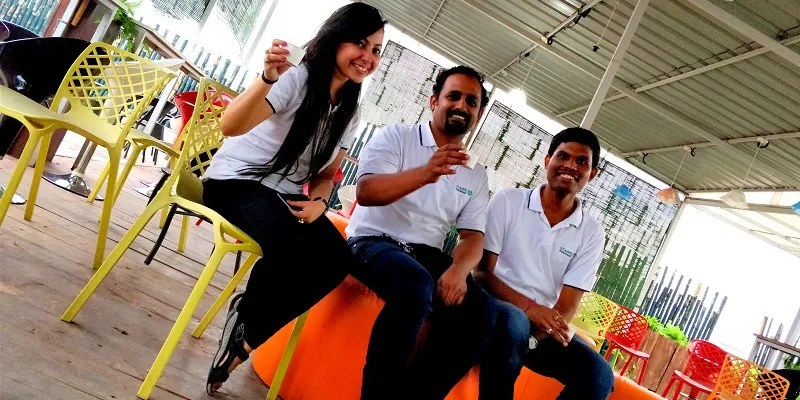With Starttopia, Tina Gupta offers startups a roof over their head, networks to bond
Of the 160 odd co-work spaces in India the investments received in this segment are predicted to be $400 million by 2018
Along the busy Silk Board road stands Vinir Tower. At first sight, the building does not appear any different from the many around, but step in and the energy is palpable.
The building is home to co-working space Starttopia, and besides offering startups the space to work along with infrastructural support like internet, meeting and board rooms and cafeteria, also creates an environment for networking.
Forty-year old professor-turned-entrepreneur Tina Gupta often walks along the corridors across the three floors, sharing a word with the 29 startups that work out of the 20,000 square feet building.
Having spent 15 years teaching entrepreneurship in seven colleges across Bengaluru, Tina realised she was missing something. “I wondered why I was not doing the real thing. I also realised in my many years of teaching that startups have no way to network and discuss their problems,” says Tina, the co-founder of Starttopia.

In 2013, Tina spoke to her husband Nitesh Gupta, a second generation businessman who runs the Rs 150 crore Vinir Engineering, about setting up networking space for startups.
Nitesh, an entrepreneur himself, saw that connecting with the right investor, partners and bankers was the biggest challenge for young companies and along with Tina sought to create a space to answer these questions. The couple already owned the real estate and began with plans for Starttopia, a networking space, which, by the beginning of 2015, morphed to a co-working space.
“We realised that co-working was a business model to go after and networking was the direct result of different companies working together,” says Tina.
Early learnings
In 2015 and 2016, the business grew without any marketing. Tina and Nitesh initially managed to fill up only 50 percent of the 500 seats in the building. A young logistics company was the first to take up space in Starttopia, and went on to raise Series-A round.
This changed the dynamics in favour of Starttopia, and many more idea-stage companies walked into the co-work space. “I was lucky because we did not have to pay rentals to our centre since the property belonged to us,” says Tina.
Tina’s business model works on charging a startup less than Rs 5000 a month per seat, and the company needs to have at least 75 percent occupancy to break even and recover the capital invested to build the company. Other companies like WeWork and CoWrks charge more than Rs 10000 per month per seat and goes close to Rs 20000 to access all facilities. Tina has so far invested $500,000, which was funded by Nitesh, and revenues are not disclosed. The occupancy is now increasing with leading startups like Ikyam and LightMetrics working out of Starttopia.
The co-working space business in India is dominated by the likes of WeWork and CoWrks, who apart from using apps to connect with businesses, offer state-of-the-art working centres that resemble five-star hotels. Starttopia provides the basics, which include WiFi and meetings rooms based on appointments.
At its heart, however, it is a place for ideas to take shape where entrepreneurs cannot afford more than Rs 5000 a month. Its second business model is to work with large industrial enterprises that want administrative staff to work out of the city and therefore prefer a co-working space.
The company caters to a clientele that needs a no-frills office space. It is high on connecting startups with industry networks and does not offer business opportunities like WeWork or CoWrks which have invested millions of dollars in the business.
Their business models also differ, with WeWork (run by the Embassy Group in India) charging a fixed percentage of the top line and bottom line. CoWrks, on the other hand, is owned by the RMZ Corp and runs the co-working space itself. CoWrks’ flagship 1.7 lakh sq ft office is located in RMZ Ecoworld, a commercial complex in Bengaluru’s Belandur IT hub. The co-working space company has two centres with over 3,550 members in Bengaluru and it plans to launch six more centres across the country.
“There are several business models that are possible in a co-work space and for the user, there are no hassles other than just paying a flat rent,” says Sharad Moudgal, partner at Khaitan and Co, a law firm that has advised in several co-work space deals. He adds that the challenge will be to manage the pricing and scale with competition heating up.

The market
Currently, there are over 160 players in the co-working space running more than 350 operational centres across Tier-1 and Tier-2 cities, according to a report by Colliers International. The better-known names among these are InstaOffice, Awfis, BHive, Regus, Spaces, 91springboard, and Investopad.
Co-working spaces have become a good option for startups and professionals who cannot afford to maintain an office because of high rentals and deposits as well as maintenance hassles. Typically, co-working spaces come in handy due to their pay-as-per-use business model.
The co-working space business operates on an around 40 percent margin, and it works if the user stays for the long term. It is collaborative in nature and works best if people keep signing up for the space.
“Co-working spaces are better than business centres, which are purely rental-based businesses. In a co-working space, an upcoming entrepreneur need not worry about setting up Wi-Fi or investing in IT, or about common area maintenance. There is one charge that covers everything,” says Shiv Prasad Singh, Professor at the Royal Institute of Chartered Surveyors School of Built Environment.
According to him, co-working spaces also offer collaboration and grade-A real estate, which was previously unavailable to entrepreneurs.
In fact, Tina believes ideas are aplenty, and startups could benefit from working at Starttopia because of its connections with the industrial world, and also with lawyers and business networks that could help startups with various aspects.







